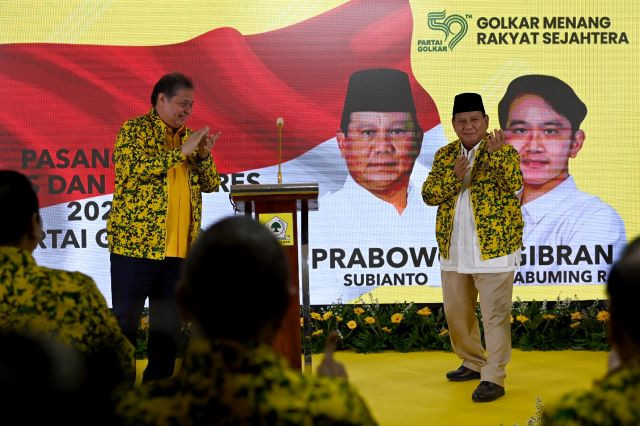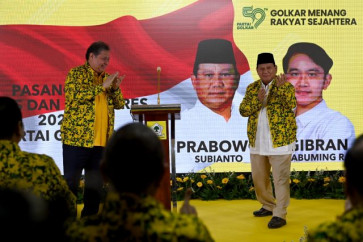Popular Reads
Top Results
Can't find what you're looking for?
View all search resultsPopular Reads
Top Results
Can't find what you're looking for?
View all search resultsWe are confronting an acute conflict-of-interest crisis
As sitting president Jokowi will have a "private" interest in the success of his son's election and a public duty to safeguard the neutrality of the state apparatus.
Change text size
Gift Premium Articles
to Anyone
 Election ready: The Gerindra Party’s presidential candidate Prabowo Subianto (right) strikes a pencak silat pose as Golkar chairman Airlangga Hartarto (left) looks on during Golkar’s national executive meeting in Jakarta on Oct. 21, 2023. Golkar announced during the meeting that it was nominating Prabowo and his running mate Gibran Rakabuming Raka for the 2024 presidential election. (Antara/Sigid Kurniawan)
Election ready: The Gerindra Party’s presidential candidate Prabowo Subianto (right) strikes a pencak silat pose as Golkar chairman Airlangga Hartarto (left) looks on during Golkar’s national executive meeting in Jakarta on Oct. 21, 2023. Golkar announced during the meeting that it was nominating Prabowo and his running mate Gibran Rakabuming Raka for the 2024 presidential election. (Antara/Sigid Kurniawan)

The Constitutional Court's controversial decision on the age limit for presidential and vice-presidential candidates last week paved the way for the nomination of President Joko “Jokowi” Widodo’s eldest son Gibran Rakabuming Raka as the running mate of presidential candidate Prabowo Subianto.
Many have expressed dissatisfaction with the process through which Gibran earned a golden ticket to the 2024 presidential election despite his lack of experience in state affairs. But in my opinion, the cause for concern is the conflict of interest during the judicial proceeding and potential conflict of interest in the upcoming election process.
The court upheld the minimum age of 40, but allowed an exception for those elected to public office, including as regional head. Gibran, the mayor of Surakarta, Central Java, just turned 36 on Oct. 1.
A conflict of interest is a situation where an individual or entity has a personal or private interest that could potentially conflict with their duty to act in the best interests of a broader public or collective entity. A judge who is adjudicating a case involving his own son for example, is in a clear conflict-of-interest situation. On the one hand, he has a private interest as a father that the case will benefit his son and on the other hand, as a judge he has a duty to deliver justice without compromise.
This does not mean that a conflict-of-interest situations will always end up with a biased outcome, the judge might still render the harshest punishment to his son, for example. But when the outcome of the case is in his son's favor, then it is difficult not to suspect that he is biased. The best way to avoid a conflict of interest is for the judge to recuse himself from the case.
There is an argument that there was no conflict of interest in the presidential-age case despite Gibran's uncle by marriage, Chief Justice Anwar Usman, sitting on the panel. The reasoning is that judicial review cases deal with normative and general principles such as age limits, rather than individual interests. Hence, the argument goes, the outcome of the case at hand would not benefit a specific individual such as Gibran.

I do not see the merit of this argument, however. There are only a few public officials aged below 40 and secondly, among those few, it was Anwar’s nephew Gibran who had been offered the nomination by Prabowo's camp. As such, when considering the context of the situation, the conflict of interest was obvious.

















